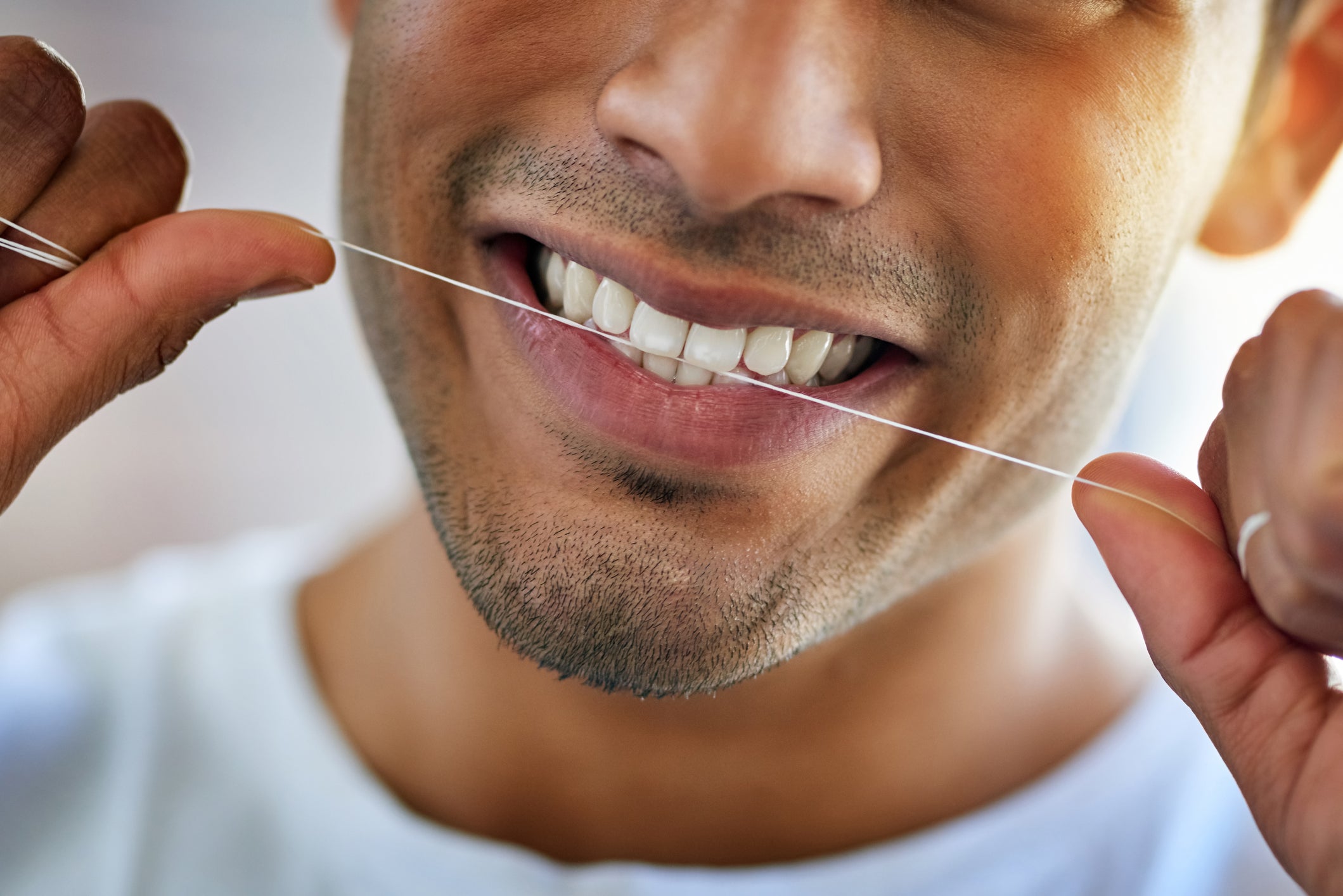-
The Connection between Diabetes and Oral Health

Diabetes affects how your body processes glucose (sugar), leading to high blood glucose levels and a host of related health problems. Diabetes can affect many areas of the body, including the eyes, kidneys, heart, and nervous system. Did you know there’s also a link between diabetes and oral health? Learn more about this connection and what you can do to promote a healthy smile.
Diabetes and Your Mouth
If left untreated, diabetes can take a toll on your oral health. Here are the potential problems you face:
- Periodontal disease: Diabetes reduces your body’s ability to fight the bacteria invading your gums, increasing the risk for periodontal disease (gum disease). This infection causes swollen, tender gums and may eventually lead to tooth loss. As with all infections, periodontal disease can cause blood sugar levels to rise. This, in turn, makes diabetes harder to control, and the vicious cycle continues.
- Tooth loss: Because advanced gum disease eventually causes your teeth to loosen and fall out, diabetes patients are more likely to face this oral health problem. In fact, one in five cases of total tooth loss is linked to diabetes.
- Cavities: Oral bacteria feed on the starches and sugars found in the food and beverages you ingest. Uncontrolled diabetes raises the glucose level of your saliva, giving bacteria more sugar on which to feed. This leads to more plaque buildup, which attacks your teeth and increases the risk of cavities.
- Dry mouth: Excessive thirst is a common symptom of high blood sugar. This is caused by the lack of saliva flow, a condition known as dry mouth. Without saliva to keep your mouth moist, your risk for cavities and periodontal disease increases.
- Thrush: This fungal infection may develop in your mouth as a result of low saliva flow and increased glucose levels.
How to Improve Oral Health if You Have Diabetes
Proper dental care is needed to prevent diabetes from damaging your teeth and gums. In addition to controlling your blood sugar levels with diet, exercise, and medication, we recommend following this dental care routine to improve your oral health:
- Brush your teeth twice a day.
- Floss once a day.
- Tell your dentist you have diabetes and report any symptoms you notice, such as dry mouth, loose teeth, or infections.
- Watch for early signs of gum disease, including redness, swelling, and bleeding gums.
- If you wear dentures, Invisalign, a retainer, or a mouth guard, brush this oral appliance daily.
- Avoid smoking. Tobacco use only worsens gum disease and other oral health problems.
- Visit the dentist at least twice a year to manage the oral health risks of diabetes.
At Park 56 Dental, we can help you prevent cavities, gum disease, tooth loss, and other oral health problems with routine teeth cleaning. We also offer restoration services to help you smile with confidence once more. To schedule an appointment with our NYC dentist, please contact us online or call (212) 826-2322.
-
How Smoking Affects Your Teeth and Oral Health

Do you or a loved one smoke cigarettes? If you’re looking for one more reason to quit, consider that tobacco use in any form raises your risk for oral health problems. Here are the issues associated with smoking cigarettes, cigars, and pipes or using smokeless tobacco:
- Gum disease: Also called periodontal disease, gum disease is an infection that causes red, swollen, tender, and bleeding gums. Smoking increases your risk of gum disease by weakening your immune system, which makes your body less capable of fighting off infection. In fact, smokers are twice as likely as nonsmokers to contract gum disease. The greater your tobacco use, the higher your risk.
- Tooth loss: As gum disease progresses, it eventually affects the underlying bone structure that anchors your teeth to your jaw. If the bone and tissue that hold your teeth in place break down, your teeth may loosen and need to be extracted.
- Plaque and tartar buildup: The chemicals in tobacco products decrease saliva flow, making it easier for bacteria to cling to your teeth and gums. If not removed daily with diligent brushing and flossing, plaque hardens into tartar, a cavity-causing, tooth-staining substance that can only be removed with professional cleaning.
- Cancer: Besides lung cancer, smoking can also cause cancer of the lips, mouth, throat, tonsils, and esophagus. The risk is six times higher among smokers. In fact, 90 percent of patients diagnosed with these oral cancers are tobacco users.
- Delayed healing: The reduced immune function caused by smoking impairs blood flow to the gums, making it harder for your mouth to heal following a tooth extraction, periodontal treatment, or oral surgery.
- Tooth discoloration: Stained, yellow teeth are a hallmark of smoking. Whitening products can sometimes counteract the effects temporarily, but the stains quickly return.
- Bad breath: Smoking leaves a stale film on your teeth and gums, resulting in “smoker’s breath.” You may be able to mask the odor with a mint for a short time, but the smell will return before long.
- Inflammation: Smoking triggers an immune response that increases the level of inflammatory markers in the bloodstream. This may increase inflammation throughout the body, including at the salivary gland openings and on the roof of your mouth.
- Darkened gums: Smoker’s melanosis, or a darkening of the gum tissue, is one response to irritating tobacco smoke. Up to 22 percent of cigarette and pipe smokers develop this oral change. There is no treatment, but the gums typically return to normal within six to 36 months of quitting.
Clearly, if you want to improve your oral health, kicking the tobacco habit is a great place to start. Your dentist can recommend useful products to help you quit, such as nicotine gum and patches. You can also pursue treatments to reverse the damage caused by smoking. For more useful tips, or to schedule an appointment with our NYC dentist, please contact Park 56 Dental online or call us at (212) 826-2322.
-
How to Prevent Gum Disease

The technical name for gum disease is periodontitis or periodontal disease. This is a common infection that, according to a recent CDC report, affects nearly half of all American adults age 30 and older.
The mildest form of this disease is called gingivitis. Early symptoms include tender and swollen gums, gums that bleed when you brush your teeth, and a receding gum line. If left untreated, periodontal disease can become painful, lead to pussy discharge, and even result in tooth loss. Advanced gum disease can also increase the risk of stroke, heart attack, and other health problems.
Protect yourself from gum disease and the associated side effects by following these preventative tips.
- Brush with fluoride toothpaste. Make this a habit every morning and evening, no matter how busy or tired you are. Use toothpaste that contains fluoride and has the ADA Seal of Acceptance. Choose a soft toothbrush, and brush thoroughly but gently to avoid irritating your gums. Brush for two full minutes, and hold your toothbrush at a 45-degree angle along the gum line so it sweeps away the bacteria hiding there.
- Floss every day. When it comes to preventing gum disease, flossing is arguably more important than brushing because it stimulates the gums and removes debris from between your teeth. The American Dental Association says it doesn’t matter when you floss—do it in the morning, at night, or after lunch—just do it!
- Swish with a medicated mouthwash. All mouthwash products offer some benefits, but some promote gum health better than others. Shop for a version that reduces plaque buildup, slows tartar formation, fights gingivitis, or all three! Remember, mouthwash complements brushing and flossing—it doesn’t replace it.
- Consider and address your risks. Some people are more likely than others to get gum disease. Risk factors include advancing age, genetics, AIDS, cancer, and hormonal changes in females. While many risk factors are out of your control, others can be addressed. For instance, you can reduce your risk if you quit smoking and control associated health conditions, such as diabetes.
- Get your teeth cleaned regularly. Gum disease develops rather quickly, and the earlier you begin treatment, the better. Therefore, children and adults of all ages should schedule a dental exam and professional cleaning every six months or as recommended by their dentist. If you already have gum disease, you may need more frequent visits to maintain your gums and prevent them from getting any worse.
At Park 56 Dental, our team of qualified dental professionals can help your smile stay healthy and beautiful. We encourage you to visit us twice a year for preventative care. Then, if you notice signs of gum disease or other oral health problems, reach out to us right away. We’ll help you slow or even reverse gum disease with effective treatments such as root planing and scaling, flap surgery, and bone and tissue grafts. Contact us online or call us at (212) 826-2322 to learn more.
RECENT POSTS
categories
- Uncategorized
- Cosmetic Dentistry
- Veneers
- Healthier Teeth
- Teeth Whitening
- Dental Health
- Video
- Dental Emergencies
- Invisalign
- Dental Implants
- Root Canal
- Sedation Dentistry
- Infographic
- Dental Crowns and Bridges
- Dental Anxiety
- Gum Disease
- COVID-19
- Bad Breath
- New York Dentist
- Cut out sugar
- General Dentistry
- Oral Health
- Oral Cancer
- Dry Mouth
- Gum Health
- Toothache
